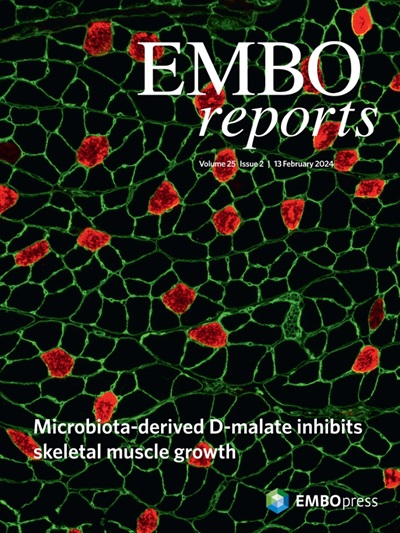HPV-YAP1 oncogenic alliance drives malignant transformation of fallopian tube epithelial cells.
IF 6.5
1区 生物学
Q1 BIOCHEMISTRY & MOLECULAR BIOLOGY
引用次数: 0
Abstract
High grade serous ovarian carcinoma (HGSOC) is the most common and aggressive ovarian malignancy. Accumulating evidence indicates that HGSOC may originate from human fallopian tube epithelial cells (FTECs), although the exact pathogen(s) and/or molecular mechanism underlying the malignant transformation of FTECs is unclear. Here we show that human papillomavirus (HPV), which could reach FTECs via retrograde menstruation or sperm-carrying, interacts with the yes-associated protein 1 (YAP1) to drive the malignant transformation of FTECs. HPV prevents FTECs from natural replicative and YAP1-induced senescence, thereby promoting YAP1-induced malignant transformation of FTECs. HPV also stimulates proliferation and drives metastasis of YAP1-transformed FTECs. YAP1, in turn, stimulates the expression of the putative HPV receptors and suppresses the innate immune system to facilitate HPV acquisition. These findings provide critical clues for developing new strategies to prevent and treat HGSOC.HPV-YAP1 致癌联盟驱动输卵管上皮细胞恶性转化。
高级别浆液性卵巢癌(HGSOC)是最常见的侵袭性卵巢恶性肿瘤。越来越多的证据表明,高级别浆液性卵巢癌可能起源于人类输卵管上皮细胞(FTECs),但输卵管上皮细胞恶性转化的确切病原体和/或分子机制尚不清楚。在这里,我们发现人类乳头瘤病毒(HPV)可通过逆行性月经或精子携带到达输卵管上皮细胞,并与是相关蛋白1(YAP1)相互作用,驱动输卵管上皮细胞恶性转化。HPV 阻止 FTEC 自然复制和 YAP1 诱导的衰老,从而促进 YAP1 诱导的 FTEC 恶性转化。HPV 还刺激 YAP1 转化的 FTEC 增殖并推动其转移。反过来,YAP1 又会刺激假定的 HPV 受体的表达,抑制先天性免疫系统,从而促进 HPV 的获得。这些发现为开发预防和治疗 HGSOC 的新策略提供了重要线索。
本文章由计算机程序翻译,如有差异,请以英文原文为准。
求助全文
约1分钟内获得全文
求助全文
来源期刊

EMBO Reports
生物-生化与分子生物学
CiteScore
11.20
自引率
1.30%
发文量
267
审稿时长
1 months
期刊介绍:
EMBO Reports is a scientific journal that specializes in publishing research articles in the fields of molecular biology, cell biology, and developmental biology. The journal is known for its commitment to publishing high-quality, impactful research that provides novel physiological and functional insights. These insights are expected to be supported by robust evidence, with independent lines of inquiry validating the findings.
The journal's scope includes both long and short-format papers, catering to different types of research contributions. It values studies that:
Communicate major findings: Articles that report significant discoveries or advancements in the understanding of biological processes at the molecular, cellular, and developmental levels.
Confirm important findings: Research that validates or supports existing knowledge in the field, reinforcing the reliability of previous studies.
Refute prominent claims: Studies that challenge or disprove widely accepted ideas or hypotheses in the biosciences, contributing to the correction and evolution of scientific understanding.
Present null data: Papers that report negative results or findings that do not support a particular hypothesis, which are crucial for the scientific process as they help to refine or redirect research efforts.
EMBO Reports is dedicated to maintaining high standards of scientific rigor and integrity, ensuring that the research it publishes contributes meaningfully to the advancement of knowledge in the life sciences. By covering a broad spectrum of topics and encouraging the publication of both positive and negative results, the journal plays a vital role in promoting a comprehensive and balanced view of scientific inquiry.
 求助内容:
求助内容: 应助结果提醒方式:
应助结果提醒方式:


